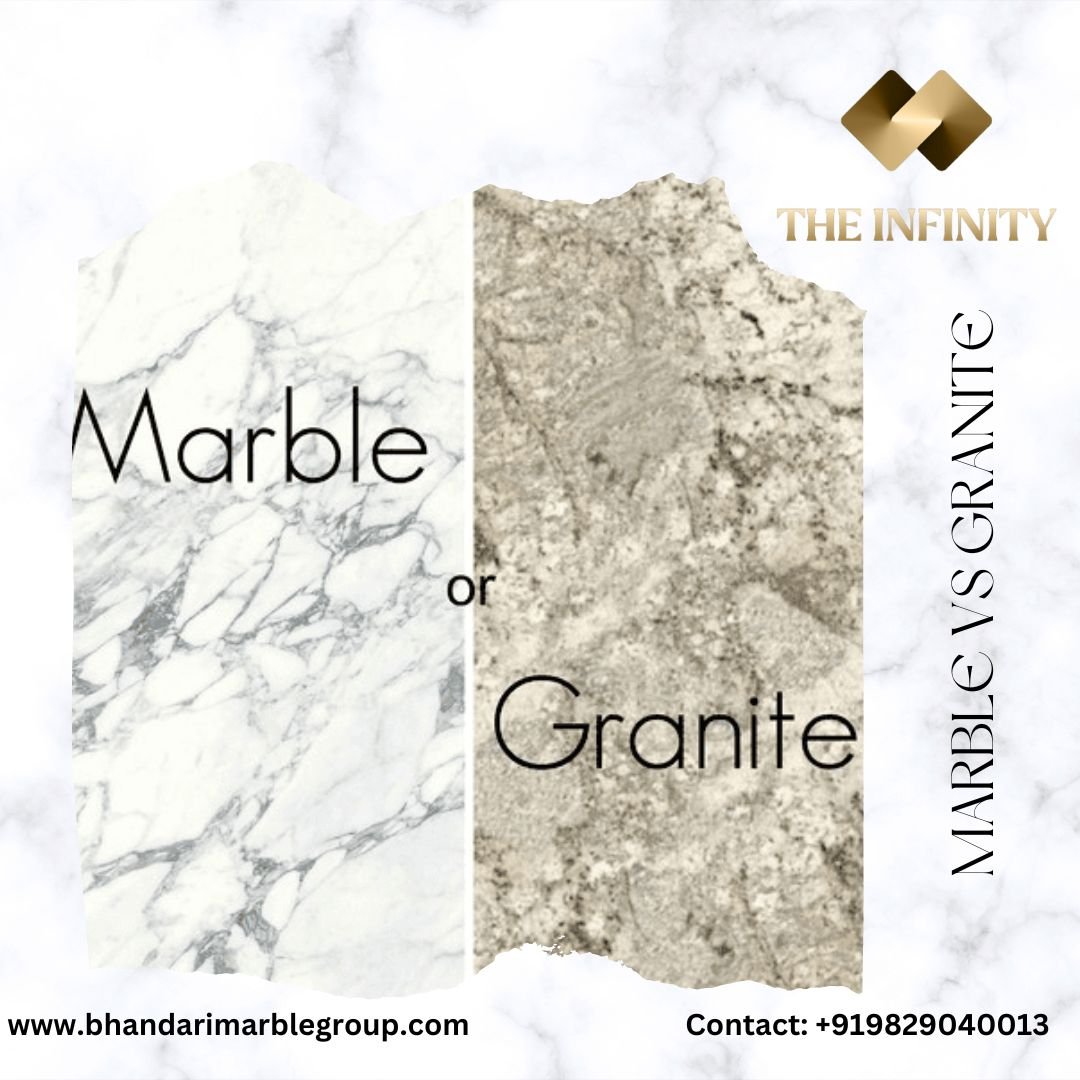MARBLE-AND-GRANITE-THE-BEST-NATURAL-STONE-BY THE INFINITY LUXURIOUS IMPORTED MARBLE BY BHANDARI MARBLE GROUP INDIA 🇮🇳
When it comes to building materials, marble and granite are both very popular surfacing materials. But that doesn’t stop the debate on marble vs granite from resurfacing every couple of days. After all, why should it not? Being naturally available stones that are available in affordable ranges, both marble and granite are great for interiors. But then, what must you choose?
Hence, to put an end to this debate, we at Bhandari Marble Group, decided to give you a comprehensive insight into both these materials; their differences with regards to strength, durability, cost, availability, and other parameters. Now that you’re here, let’s get you started on the marble and granite difference right away.
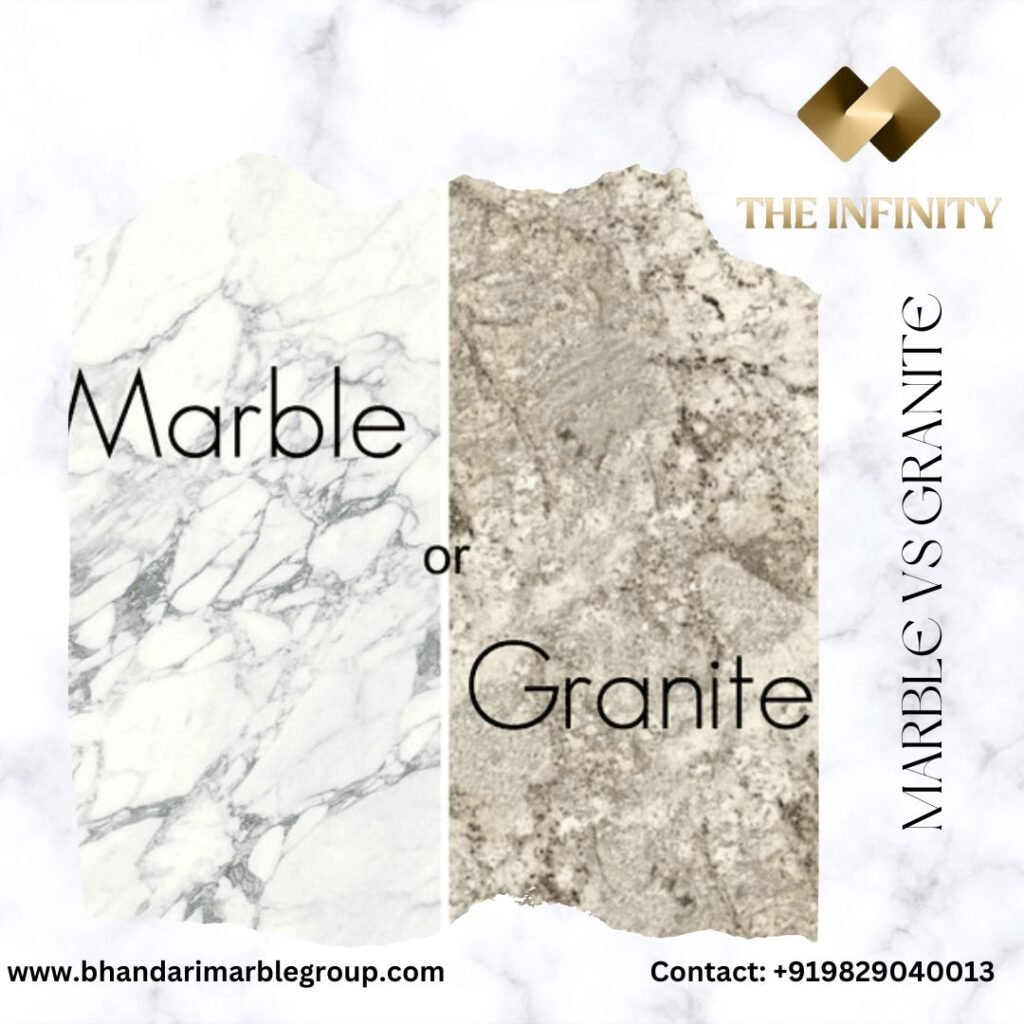
What’s the Difference Between Marble and Granite?
Although marble and granite are both widely available stones, there are some crucial differences that set them apart from one another.
MARBLE VS GRANITE
| Marble | Granite | |
| Durablility | Durable; has a hardness of 3-5 on the Mohs scale | Highly durable; has a hardness of 6-7 on the Mohs scale |
| Acidic Resistance | No; marble is porous, so it’s more prone to etching | Yes; granite has a high density |
| Porous | Yes; it’s a soft metamorphic stone that requires sealing | No; it’s not affected by water, but it’s best to have it sealed |
| Cost | Affordable than granite; some varieties can cost more | Affordable; granite price can be ₹80-₹2200/sq.ft. depending on many factors |
| Damage by Strong Chemical Cleaning Liquids | Strong chemical cleaning liquids can cause damage and discolouration | Strong chemical cleaning liquids can wear away the sealant, and can cause discolouration |
| Stains | Prone to acquiring stains & spills due to high porosity | Not prone to stains; even acidic liquids don’t permeate granite as long as it has a sealant barrier |
| Outdoors | Usage not recommended; but can be used with sealants | Can be used with or without sealants |
| Heat Resistance | Susceptible to heat damage; not recommended for kitchen countertops | Highly heat resistant; ideal for kitchen countertops |
| Scratch Resistance | Prone to getting scratches from common activities like cutting | Very hard stone; naturally scratch resistant |
| Maintenance | Might be better to polish and reseal twice a year | Low maintenance; might require polishing once every few years |
| Appearance | Has veins in a different colour; most popular colours include white, black, green and chocolate; available in light to medium shade | Can have freckles in a variety of colours or veins; every slab of granite is entirely unique and can come in black or solid colours; available in medium to dark shade |
| Properties | Crystalline rock which can get dull over time | Igneous rock which retains its shine |
| Used for | Flooring, pooja rooms, wall cladding, shower walls, vanities, tub decks; Recommended for usage in low footfall areas | Countertops, tabletops, flooring, outdoor landscaping, wall cladding; Recommended most for high footfall areas due to its strength |
| Origin | Metamorphosis of sedimentary rocks | Solidifcation and cooling of Magma |
| Environmentally-Friendly | Can last for many years; but carbon footprint is high for mining, transportation and installation | Can last for many years; but carbon footprint is high for mining, transportation and installation |
| Health Risks | Can emit carbon dioxide when exposed to heat |
Pros & Cons of Marble
PROS
- Marble can last very long, if maintained properly
- It is unique and has a rare lustre, that gives it a sophisticated vibe
- Plus, it is a 100% naturally occurring mineral that’s widely available
- Marble is affordable
CONS
- Being a softer stone, marble can be vulnerable to nicks and cracks (if not sealed well)
- Marble can be vulnerable to stains, hence not recommended for usage in kitchen countertops
- Needs frequent sealing
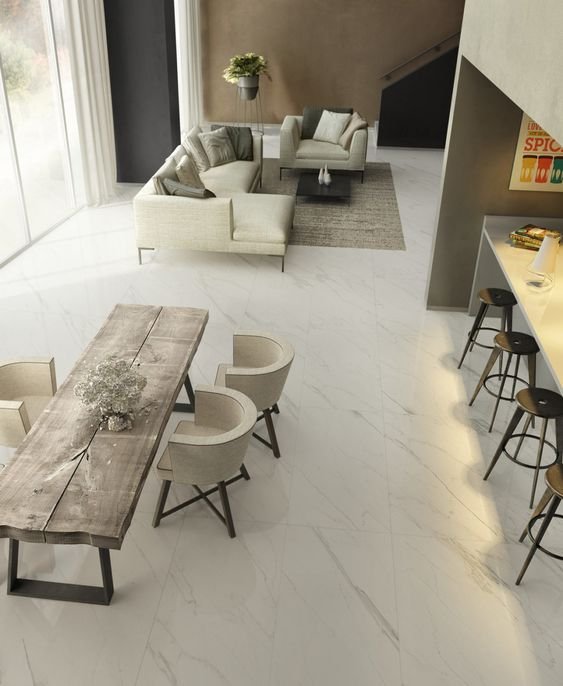
Pros & Cons of Granite
GRANITE PROS
- Granite is great because it’s heat-resistant and durable (ideal kitchen countertop material)
- It’s scratch-resistant with or without a sealant, so it is great for outdoor landscaping as well
- Granite is also naturally stain-resistant. When sealed well, it’s absolutely stain-proof
- Incredibly versatile, safe and non-porous (so no room for moisture or bacteria)
- It’s very durable as well as aesthetically appealing
- Affordable versions are available; though certain varieties can be expensive
CONS
- Dark granite slabs aren’t trending anymore
- Can be susceptible to cracks, if not maintained well
- As granite slabs have to be cut, they will show seams when used in L-shaped and U-shaped kitchen layouts

Marble vs Granite: The Battle of the Greats
When it comes to marble vs granite, there’s no clear winner. As granite is naturally heat-resistant, stain-resistant and scratch-resistant, it happens to be the personal favourite of many designers. Others like marble for its lustre, easy availability and affordability. If you’re looking for the right material, you can choose a mix of granite and marble for your home.

FAQs
1. Which Is Better: Marble or Granite?
Comparatively, granite is better than marble due to the former’s non-porosity, natural stain-resistance and heat resistance. Marble and granite are both popular surfacing materials suited for different areas of the home.
2. Which Is Costly: Marble or Granite?
Marble and granite are both affordable, and they both have varieties which are expensive. However, marble is more affordable than granite sometimes.
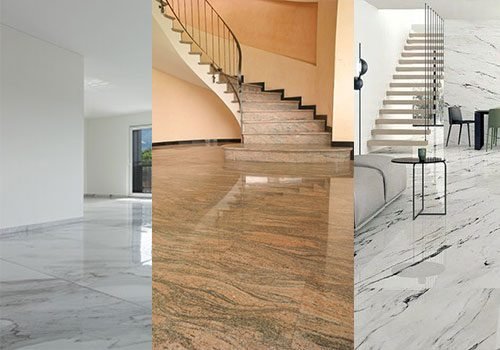
3. What Is the Difference Between Granite and Marble?
Granite is a harder rock than marble. It is also stain-resistant, heat-resistant and scratch resistant. Plus, it withstands exposure to water.
4. Which Is Good for Health: Marble or Granite?
Both marble and granite are considered safe. However, if you expose marble to acidic liquids, it can emit carbon dioxide, which is bad for health.
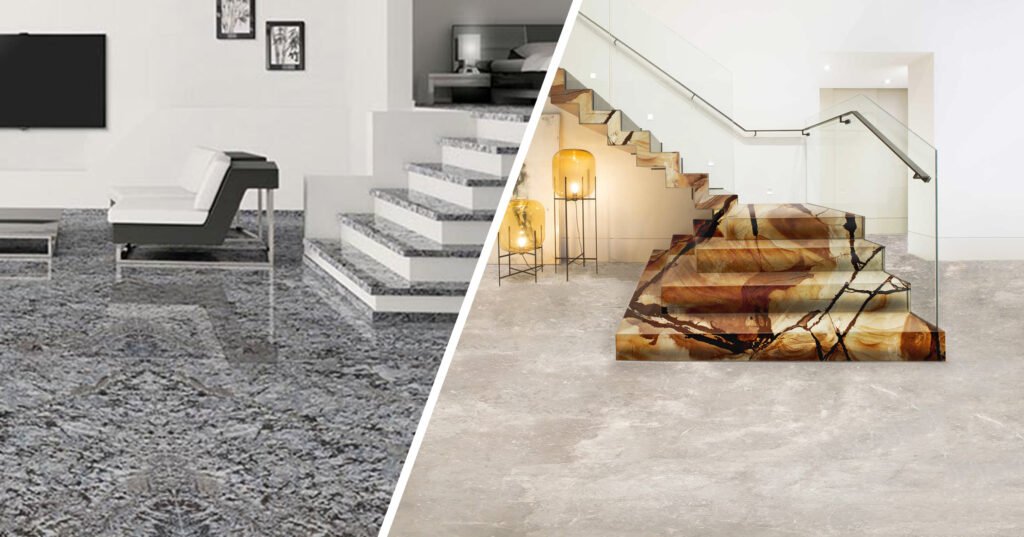
WORLD’S TOP AND INDIA’S BEST MARBLE, GRANITE AND STONE COMPANY
ADD BY EXPERT AND EXPORT TEAM OF BHANDARI MARBLE GROUP. CONTACT US ON: +919829040013

